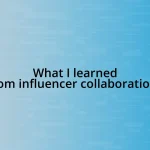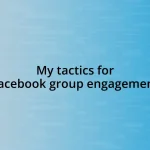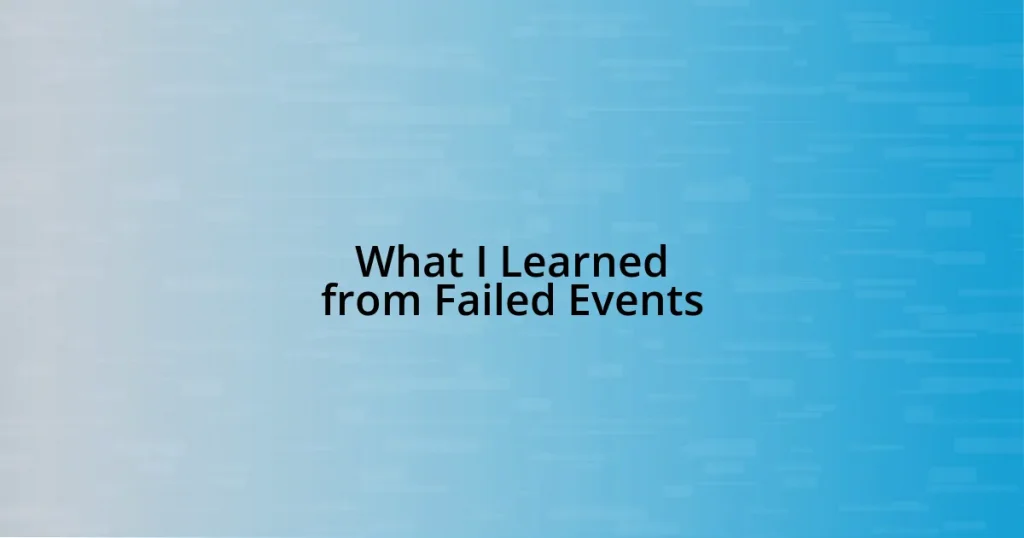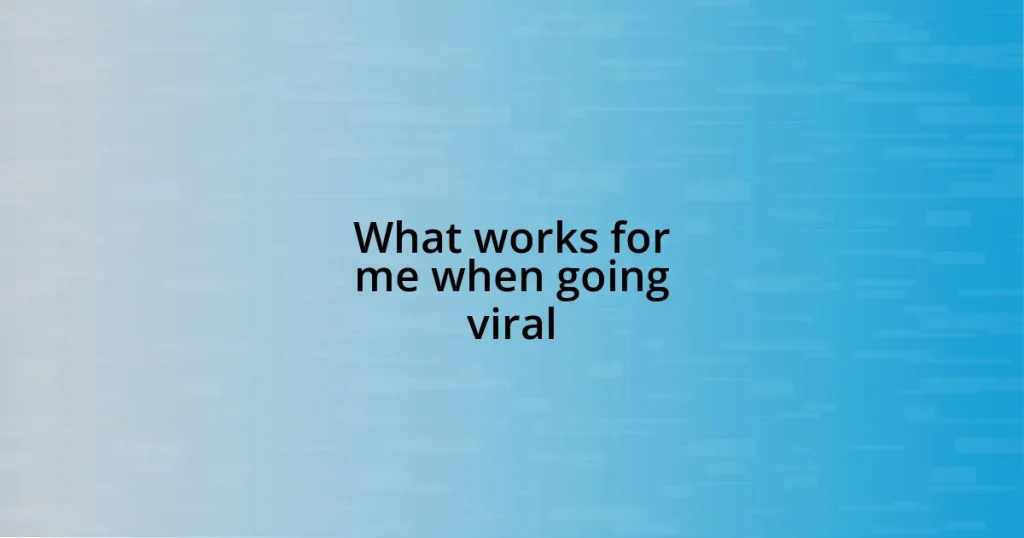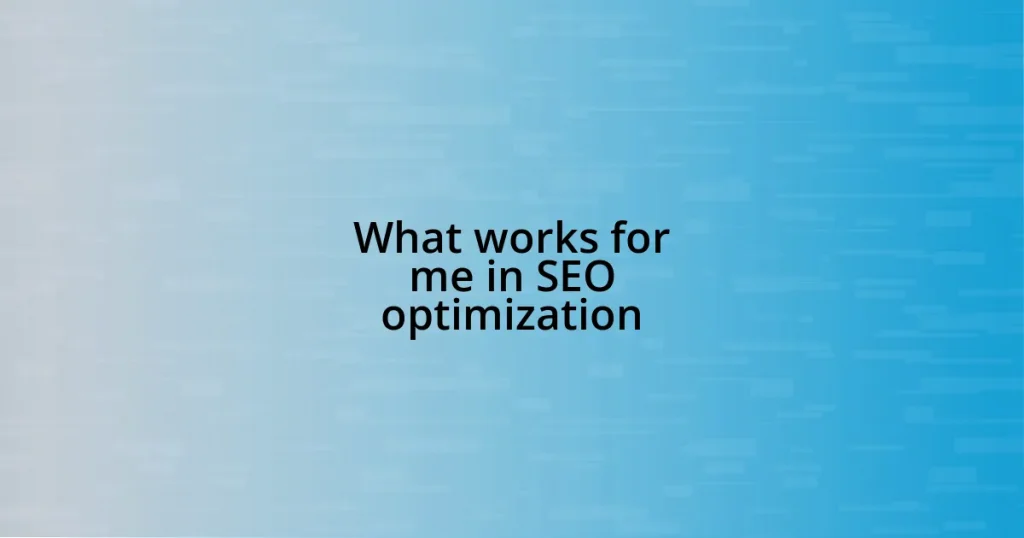Key takeaways:
- Failure offers valuable lessons and can reshape perspectives, transforming setbacks into stepping stones for growth.
- Common reasons for event failures include insufficient planning, poor communication, neglecting audience needs, technical glitches, and inadequate promotion.
- Key strategies for improving future events include developing clear communication plans, conducting post-event surveys for feedback, and leveraging technology to enhance engagement.
- Building resilience through failures involves adapting to challenges, understanding audience needs, and embracing progress over perfection for continuous improvement.
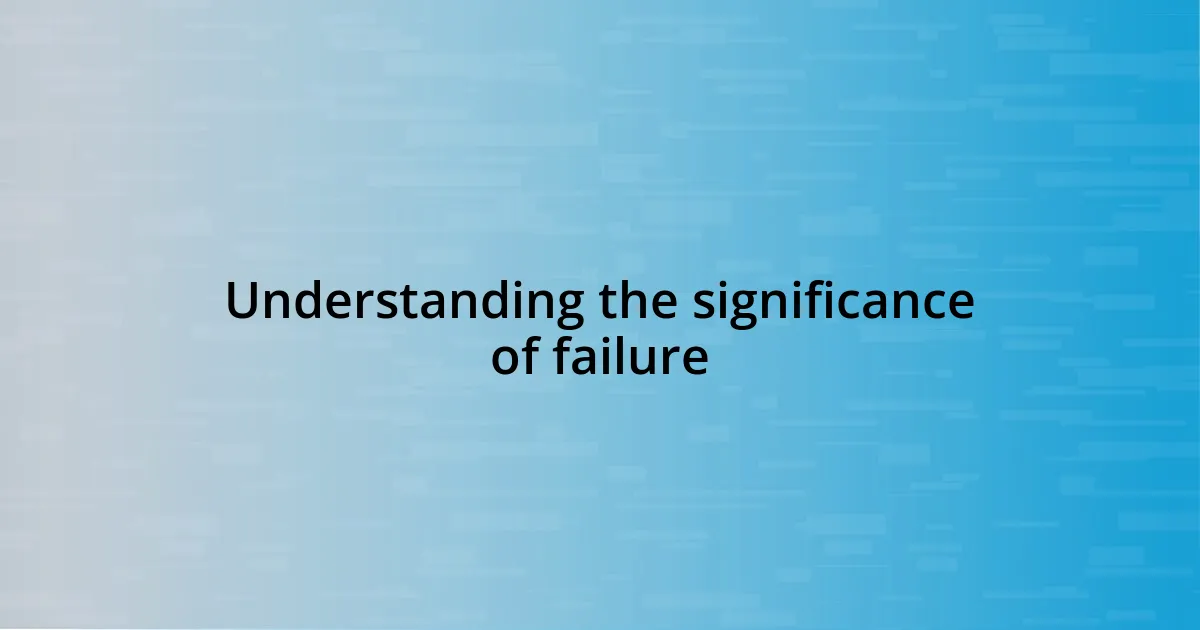
Understanding the significance of failure
Failure often brings us face to face with our vulnerabilities. I remember a project I led that fell flat because I underestimated the time required. It was a tough pill to swallow, but in that moment of disappointment, I realized that each misstep holds a lesson that can pave the way for future successes. Isn’t it fascinating how the hardest moments can become the most enlightening?
When we think about failure, it’s easy to feel overwhelmed by shame or frustration. I’ve been there myself, grappling with feelings of inadequacy after a presentation tanked. However, I began to see these experiences not as definitive judgments of my abilities but as stepping stones toward growth. Have you ever considered that failure might just be a necessary chapter in everyone’s journey?
Ultimately, understanding the significance of failure allows us to reshape our perspectives. Each setback offers a unique chance to reflect on our choices and strategies. I’ve learned to embrace my failures for the clarity they provide. What insights have you discovered from your own experiences with failure?
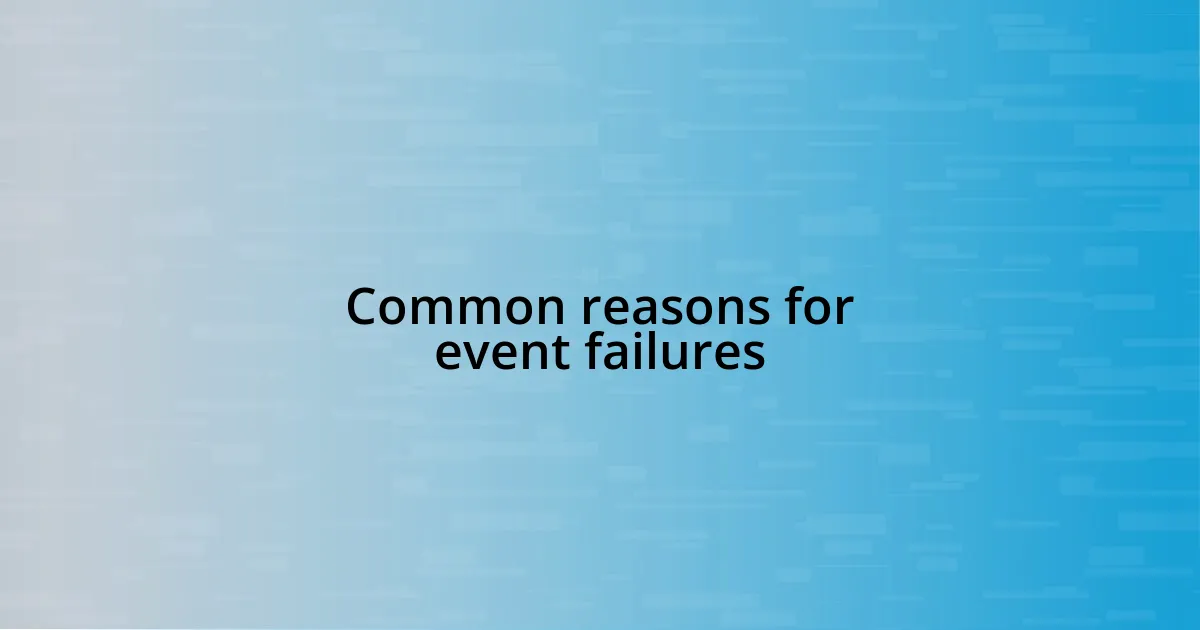
Common reasons for event failures
It’s easy to overlook the finer details that can lead to an event’s downfall. One time, I organized a corporate workshop and focused solely on the big picture, ignoring the nitty-gritty logistics. That oversight created a disjointed experience for participants, which was frustrating to witness. Little things, like clear communication and thorough planning, can have a significant impact on the overall success of an event.
Here are some common reasons I’ve identified that lead to event failures:
- Insufficient Planning: Whether it’s timelines, budgets, or resources, ignoring the planning phase can set a project up for disaster.
- Poor Communication: Failing to convey critical information among team members can create confusion and lead to mistakes.
- Neglecting Audience Needs: Not understanding the audience’s expectations or preferences can alienate them and diminish engagement.
- Technical Glitches: In our tech-driven world, overlooking equipment checks can result in embarrassing technical failures during an event.
- Inadequate Promotion: A lack of marketing can leave your event under-attended and uninspired, even if the content is top-notch.
Each of these breakdowns reminds me that success is a collective effort woven through collaboration and understanding.
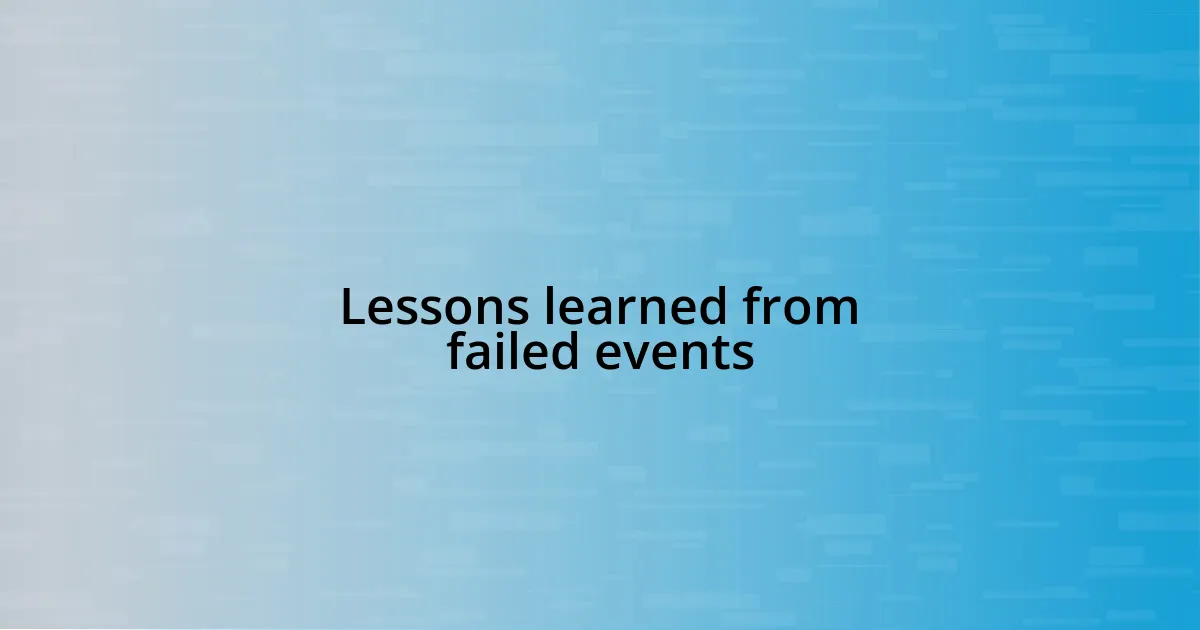
Lessons learned from failed events
Understanding lessons learned from failed events holds a treasure trove of insights that can only come from experience. After an event I organized fell flat due to lack of audience engagement, it struck me how pivotal it is to truly know your attendees. Engaging with them beforehand could have guided the theme and adjusted the content to what they were seeking. It’s like having a map; it helps you steer in the right direction!
Another lesson I absorbed from past failures is the importance of adaptability. I once planned an outdoor event, only to have the weather turn sour unexpectedly. Instead of panicking, I shifted to an indoor venue, and what I learned was invaluable. Flexibility in the face of challenges not only salvaged the day but also fostered a sense of resilience within my team. It’s fascinating how a moment of crisis can reveal a new path forward, isn’t it?
Lastly, emotional reflection on these experiences has been a game-changer for me. The disappointment of a failed event can feel heavy, but I’ve learned to channel that energy into positive action. Instead of dwelling on what went wrong, I now assess what can be done better next time. There’s a profound empowerment in transforming failures into constructive feedback, driving me to improve continuously. What about you—how do you turn setbacks into stepping stones?
| Lesson | Description |
|---|---|
| Know Your Audience | Research audience needs and preferences to tailor the event experience effectively. |
| Be Adaptable | Stay flexible and ready to pivot when unforeseen challenges arise. |
| Reflect Emotionally | Use emotional responses to failures to motivate constructive feedback and improvement. |
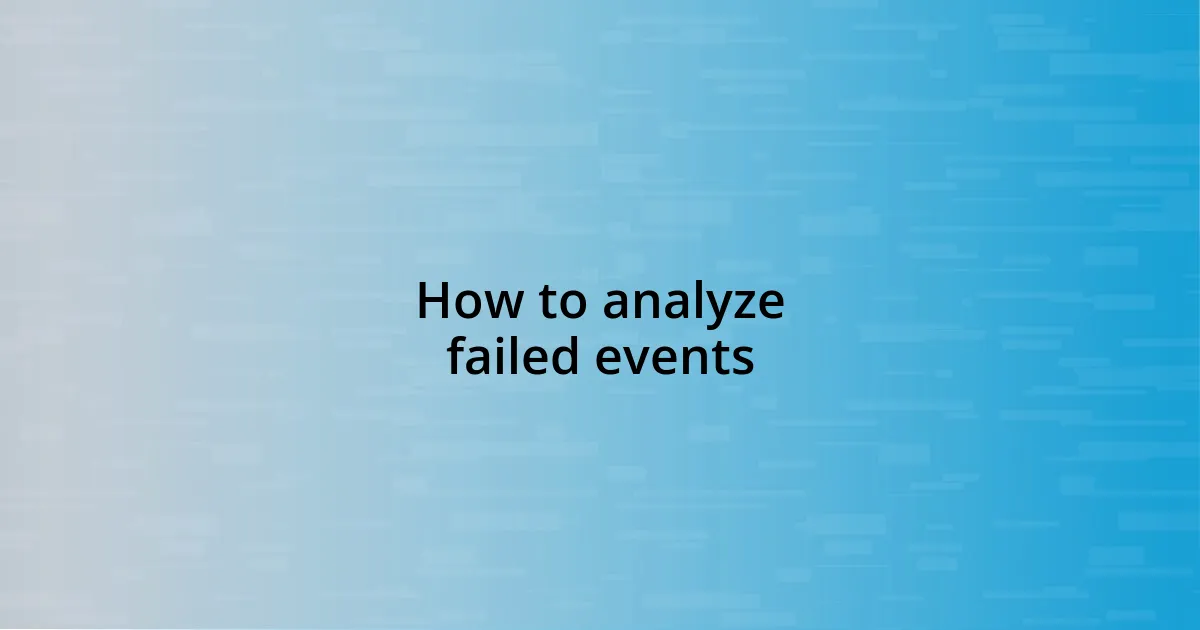
How to analyze failed events
Analyzing failed events can be quite an enlightening process if approached correctly. I remember a particularly poorly attended seminar where I gathered feedback afterward. It struck me how vital it is to dig deep and ask participants what specifically turned them off—even if it’s uncomfortable. Uncovering these insights not only helps identify what went wrong but provides a roadmap for future success.
I also believe in using a ‘root cause analysis’ approach. I once attended a conference that fell flat, despite good planning. As I reflected, I realized that merely analyzing the symptoms of failure, like low attendance, wouldn’t suffice. Instead, I had to look for deeper issues—maybe the theme didn’t resonate or the timing clashed with other events. This comprehensive examination made me understand how interconnected various aspects of event planning can be.
In my experience, documenting the entire process is essential. After one less-than-stellar gala, I started keeping a failure journal, noting things that went well and where I faltered. I found it therapeutic to revisit these experiences and recognize patterns over time. Have you ever reflected on a setback and found a recurring theme? It’s fascinating and often the key to improving not just my events but my overall approach to planning.
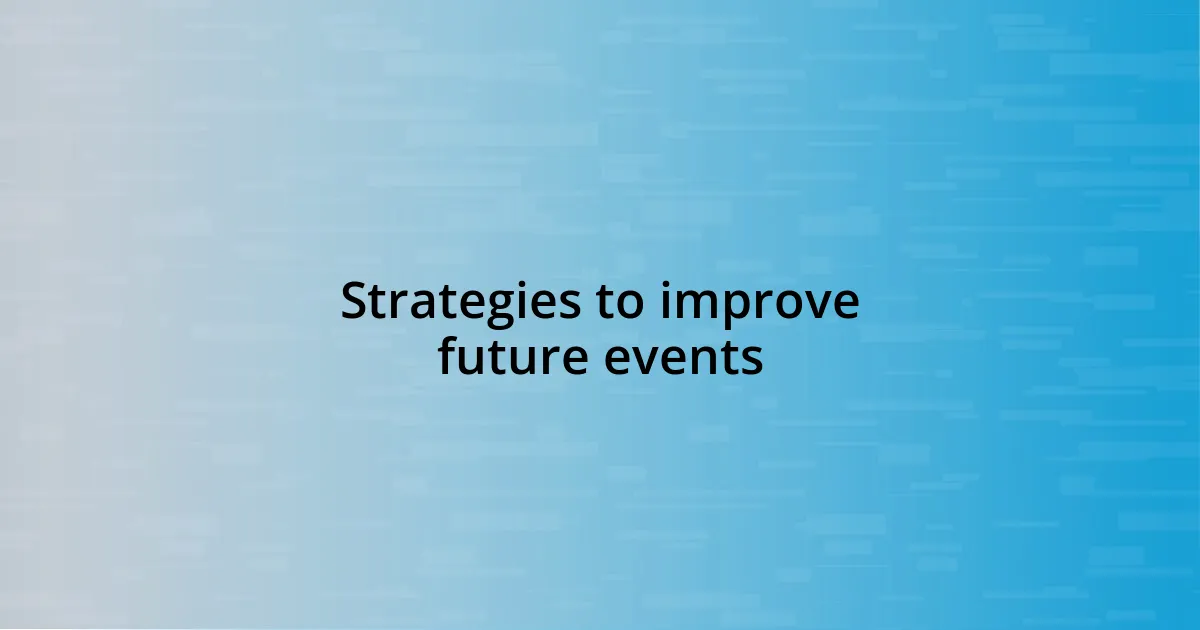
Strategies to improve future events
One of the most effective strategies I’ve adopted for improving future events is developing a clear communication plan. I recall organizing a team meeting where roles and responsibilities were muddled. This led to confusion and, ultimately, a lackluster execution. By creating a detailed communication strategy that outlines who’s in charge of what, I noticed a dramatic improvement in collaboration and efficiency. Have you ever felt lost in a project due to unclear communication? I certainly have, and it now drives me to emphasize clarity from the get-go.
I also prioritize post-event surveys for actionable insights. After hosting a workshop that fell flat, I was hesitant to ask for feedback fearing negativity. But once I did, the responses revealed critical changes attendees wanted. This has become a cornerstone of my planning process now. It’s incredible how a simple survey can transform a so-so event into something attendees truly look forward to. What do you think—are we too afraid to seek honest opinions sometimes?
Finally, I can’t stress enough the value of leveraging technology to enhance engagement. During a recent online seminar, I experimented with interactive polls and chat features. The difference was night and day; it was as if the participants came alive! Integrating these tools made the audience feel involved, as opposed to just passive listeners. Have you ever engaged with an audience in a way that suddenly changed the dynamic? That experience reminded me that with a little creativity, we can turn even a simple event into a memorable experience.
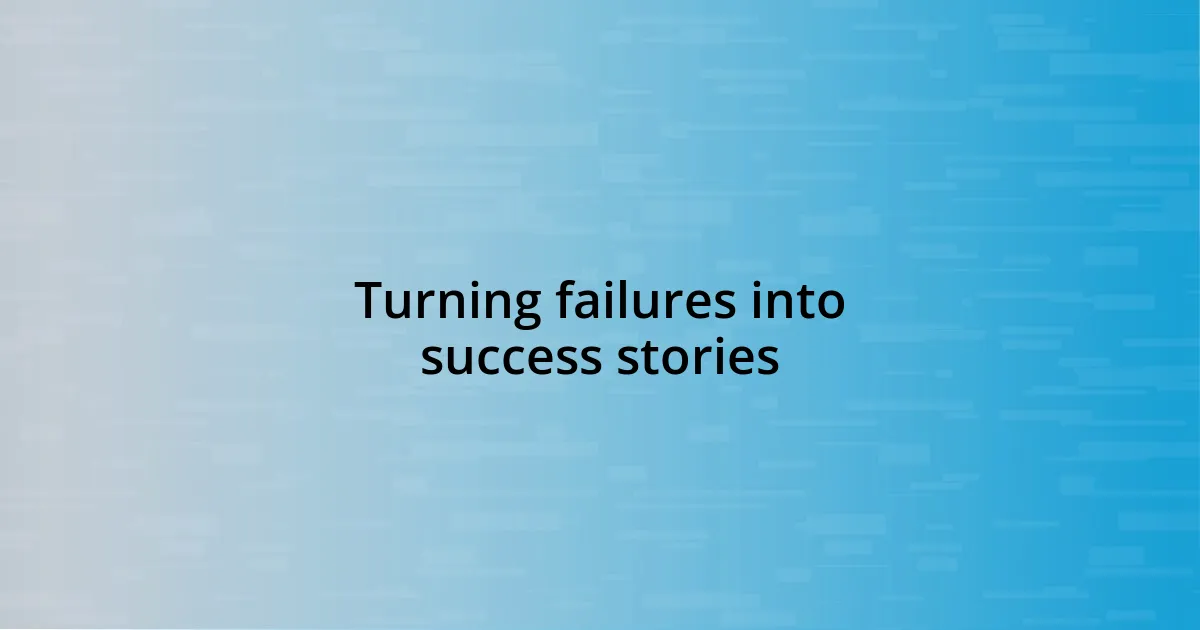
Turning failures into success stories
Reflecting on failures has often allowed me to unearth unexpected strengths. I once organized a workshop with a grand vision but ended up with limited attendance. Instead of viewing it as a defeat, I took it as an opportunity to reassess my audience’s needs. Through this lens, I realized my topic wasn’t appealing enough. The next time, I shaped the content around what attendees were genuinely interested in, and the turnout doubled. Isn’t it remarkable how a setback can lead you directly to clearer insight?
One time, I faced a catastrophic technical glitch during a live webinar. It felt like the end of the world at first, but instead of panicking, I quickly engaged with the participants. I asked them to share their own experiences with technology failures. The conversation transformed the frustration into a shared joke and united us in the moment. That mishap taught me the power of adaptability and the importance of turning a moment of failure into an engaging opportunity. Have you ever turned an awkward moment into a bonding experience?
I’ve also discovered that documenting these challenges often leads to personal growth. After hosting a charity event that missed its fundraising goals, I took a week to reflect on what I could have done differently. As I mapped out my thoughts and emotions in a dedicated journal, I noticed a pattern in my decisions leading up to the event. Those insights bridged the gap between past failures and future successes, making me recognize my own growth journey. What if we took the time to really understand our failures as stepping stones instead of roadblocks?
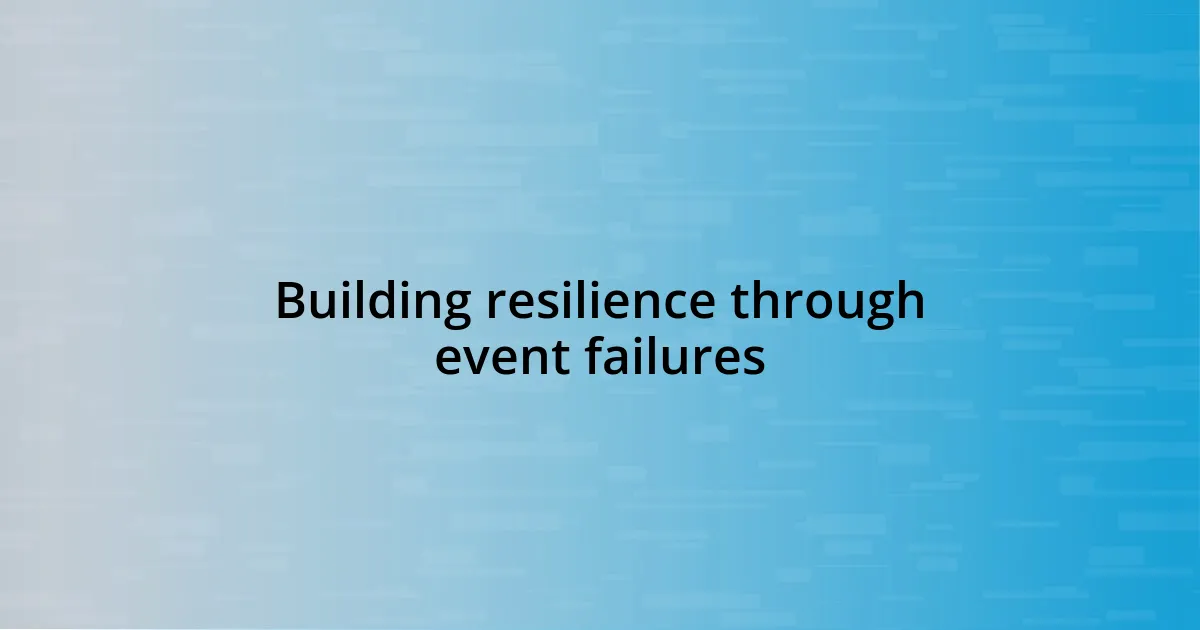
Building resilience through event failures
Building resilience through event failures is all about reframing our perspective on setbacks. I remember facing a total flop at an outdoor event due to unforeseen weather conditions. While the rain poured down, I initially felt defeated, but this experience pushed me to think creatively. Instead of canceling, I pivoted to an indoor setup, which ended up being cozier than I anticipated. Have you ever been forced to improvise and found that it brought out your best skills in the process?
Another time, I organized a conference aimed at fostering community connections, only to hear feedback that it felt too corporate and uninspiring. This was a gut punch, but it lit a fire under me to dive deeper into what my audience wanted. I started hosting informal meet-ups to better grasp their needs and preferences. The next event? A vibrant gathering filled with laughter and meaningful conversations. How did I not see the need for a more personal touch sooner?
Ultimately, the lessons I learned from these failures taught me that resilience is all about endurance and adaptation. I’ve learned to embrace each stumble as a chance to refine my approach. After recognizing my tendency to aim for perfection, I shifted to embracing progress over perfection. Each failure became a stepping stone for growth, and I now have a toolkit of strategies to navigate future events. Have you found that your own missteps have fueled your journey toward resilience?








